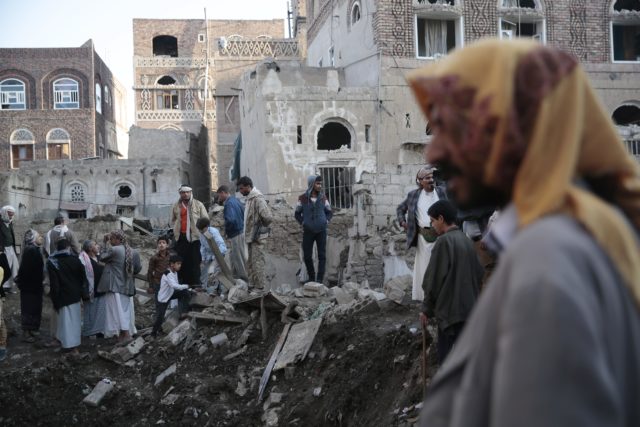
The United States is already militarily involved in Yemen, with special forces targeting al-Qaeda and Islamic State operatives who are then attacked by American drones. Thus far, however, it has stayed mostly outside the Yemeni civil war, in which Iranian-backed Houthi forces are fighting the Saudi-UAE-supported Yemeni government, although there are reports that Americans are helping locate and destroy ballistic missiles and launch sites that Houthi rebels have used to attack cities in Saudi Arabia.
Why should the United States increase its support for the anti-Houthi faction, particularly lacking any congressional support for additional involvement in Yemen? The Houthis are not America’s enemy; the enemy is Iran, which declared war on us in 1979 and pursues a variety of strategies to wear us down while it pursues its illicit nuclear and ballistic missile programs.
Expanding the American role in Yemen would serve Iran’s strategic interests rather than our own. The Iranians hope a bigger American footprint in Yemen – along with deployments in Afghanistan, Iraq, and Syria – will sap American resources, cost lives, sow civil discord, and reduce American prestige. Iran believes that its stock will rise accordingly.
According to news reports, the UAE has asked for U.S. help in an operation to take control of the port of Hodeidah, Yemen’s fourth-largest city, sitting on the Red Sea near the entrance to the Gulf of Aden. It is a strategic location for Red Sea shipping and an important stronghold for the Iran-backed Houthi fighters. The port has played an important role in the delivery of emergency aid supplies to Yemen. Hodeidah has been bombed on different occasions by Saudi-coalition air forces, and facilities at the port – especially large cranes and dock equipment – have been destroyed.
Yemeni forces, backed by the Arab coalition, have taken control of the tourist resorts in Al Nukhaila in the Al Duraihimi province just west of the rebel-held port city of Al Hodeidah, an operation that killed some 73 Houthi fighters, according to Arab sources. But it is doubtful that Yemeni anti-Houthi forces can complete a mission to take control of Hodeidah province and its port without outside support.
The UAE (probably speaking for the Saudi government as well) claims to want only American intelligence and the use of drones to complement the Arab mission. Keeping in mind, however, that neither the UAE nor the Saudis have ever launched a successful land attack, particularly one that requires amphibious landings and air drops, the job will likely require far more from the U.S. It is only a small jump from there to American involvement in an across-the-board military effort.
While it is true that Iran is supplying missiles and weapons and probably financial support to the Houthi insurgency, as well as operating in Iraq, Lebanon, and Syria, Iranian support for Shi’ite causes is not the most important threat to U.S. security.
Much more important is Iran’s ability to destabilize or gain control of friendly countries in the region, to threaten Israel with ballistic missiles and possibly nuclear weapons, and to threaten Saudi Arabia with annihilation. Responding to the mess in Yemen is a poor way to deal with these important challenges.
If the United States wants to stop Iran, Yemen is not the best place to do it. Iran, after all, has nothing much to lose there since, even in the unlikely case that the Houthis are finally defeated (which will be costly), it won’t matter in the big picture. Iran can use the defeat – of someone else, not itself – as a rallying cry against the “Great Satan,” step up its nuclear and missile programs, and drop the fake posture it is using successfully right now as a “nice guy” in full compliance with the Joint Comprehensive Plan of Action (JCPOA, the “Iran deal”) from which President Trump rightly withdrew.
The best way to deal with Iran is twofold:
- Support opposition to the Iranian regime in order to destabilize the ruling mullahs.
- Knock out key Iranian assets either using covert means or through specifically targeted operations.
Neither of these options constitutes American-generated “regime change,” and that’s as it should be.
The place to start is to make an effort to understand the vast store of sensitive intelligence that the Israelis lifted from Iran. Among other things, documents show that Iran’s military is in charge of refining uranium to 90% (weapons grade) and has been for quite a while. The military is completely outside the JCPOA, so it should be understood that despite the deal, or alongside the deal, or in subversion of the deal, Iran is and has been making weapons-grade material and probably building its first nuclear weapons. It continues to seek WMD technology from Germany, among others, and the Iran-North Korea nuclear axis requires a much harder look by the United States and other intelligence agencies.
It is relevant and vitally important to use the Israeli-procured information to develop a real strategy against the mostly hidden and growing threat of a nuclear Islamic Republic – one that got its start long before the JCPOA, continued through it, and continues to this day.
Forget the Houthis.





